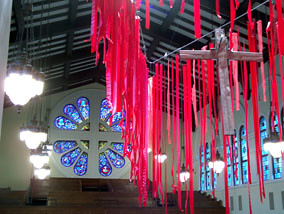Matthew 16:21-28:
This past week HRC invited me out to Washington DC to help write about the church year as viewed by transgender eyes. Perhaps this is why I'm particularly reading this text with transeyes this week.Those who want to save their life will lose it. This makes me think of the great wilderness space that many trans folk occupy for years of their lives. Sometimes it is because of fears about how others will treat us if we transition. Sometimes it is because of our own fears about losing control if we enter (or re-enter) a time of puberty. Sometimes it is because we truly need to honor other commitments in our lives or don't have access to hormones, surgeries or communities that are tolerant.
In DC, I heard the story of a transwoman who waited until the age of 76 to transition because she loved her wife and knew that she couldn't transition and maintain the relationship she vowed to honor and cherish. Not knowing what it must have felt like for this transwoman to make the decisions she made. Living in different shoes, with different eyes and different sets of privilege, I note that this weeks lectionary text can be read in a number of ways.

Is the cross, the life choices the transwomen made to delay transition? Is it finally deciding to transition and carry through with what she knew to be her destiny? What is the cross? Is it the suffering or the end of suffering?
Perhaps that depends on us, and our perspective, assumptions and biases.
Only the 76 year old transwoman could say for sure, but today I remember the joy of this woman. The courage it would take to transition without the support of the relationship that clearly meant so much to her.
What must it feel like for her, after 76 years of wilderness, to feel like she can look at a body without shame, or wishing that it was profoundly different?
Isn't this afterall what our Christian journey is as well. To transform that moment in the garden of bodily shame, to strive to be people who can be naked with each other without shame.
Nakedness is the essence of unity, of not being torn apart, of being for the other, of respect for what is given, of acknowledging the rights of the other as my limit and as a creature. Nakedness is the essence of being oblivious of the possibility of robbing others of their rights. Nakedness is the revelation; nakedness believes in grace. Nakedness does not know it is naked just as the eye does not see itself or know about itself. Nakedness is innocence. – Dietrich Bonhoeffer, Creation and Fall.
